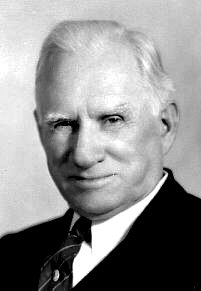 William R. Newell was born on this day, May 22, in 1868. He pastored a church in Chicago until Dwight Moody invited him to assist R. A. Torrey in supervising the great Bible Institute (later to be named after Moody). Newell wrote the hymn “At Calvary” (“Mercy there was great and grace was free…”) and a number of verse-by-verse commentaries that were very popular. He died in 1956.
William R. Newell was born on this day, May 22, in 1868. He pastored a church in Chicago until Dwight Moody invited him to assist R. A. Torrey in supervising the great Bible Institute (later to be named after Moody). Newell wrote the hymn “At Calvary” (“Mercy there was great and grace was free…”) and a number of verse-by-verse commentaries that were very popular. He died in 1956.
Newell’s Bible teaching was characterized by a disarming directness and freshness. He was a good student, able to consult the best commentaries, but he always took up the Scriptures first-hand and expounded them with memorable originality.
One example of his characteristic way with Bible teaching is the sketch he gives of how the letters of Paul, taken in their canonical order, present a progressive course of instruction in doctrinal development and growth in spiritual experience. I’m not sure he’s right. And I have invested more time in trying to see progressive or cumulative teaching in the chronological sequence of Paul’s letters, which seems to me to be a more promising task. But Newell’s attempt is fascinating. Here it is, from an appendix to his Romans, Verse by Verse:
(1) In Romans man is shown with righteousness: “There is none righteous, no not one.” This involves man’s fundamental relation to God. Christ is set forth a propitiation, meeting all Divine claims, and by His death releasing man from the necessity of a righteousness and holiness of his own: Christ becomes his righteousness, and a believer has the witness of the Spirit that he is God’s child.
(2) I Corinthians. Here the subject is not righteousness but wisdom. The words “wisdom” and “wise” occur in the first four chapters twenty-five times, and the words “foolish” and “foolishness” some eight times! In 1:30 we are seen as of God—we that are in Christ Jesus who was “made unto us wisdom from God,” which indeed includes “Righteousness, Sanctification and Redemption” but Christ is looked at as our Wisdom. Indeed in 2:16, “We have the mind of Christ.” Those declared righteous in Romans, and become children of God, are now brought to school—as children should be. But lo! the wisdom of the world is “foolishness,”—therefore God’s “wisdom” is revealed to these children of God by the Spirit, the Holy Spirit indwelling them (2.6-16).
(3) II Corinthians. Here we find Christ our sufficiency. Declared righteous in Romans, instructed by the Spirit in I Corinthians, the believer has yet to learn his utter weakness. The key-verses are here are 12:9-10: “When I am weak then am I strong,” and, “My grace is sufficient for thee.” Many believers never find that God alone is their strength along every line. Paul found it! Read 1:8-10. Again: “We have this treasure in earthen vessels, that the exceeding greatness o the power may be of God, and not from ourselves” (4:7-11). Again:
“Our outward man is decaying, yet our inward man is renewed day by day” (4:16). Again: “Our flesh had no relief, but we were afflicted on every side; without were fightings, within were fears. Nevertheless he that comforteth the lowly, God, comforted us by the coming of Titus” (7:5, 6). Again: “Most gladly therefore will I rather glory in my weaknesses that the power of Christ may rest upon me” (12:9).(4) Galatians. The Epistles are linked together, each leading on to the following. So, in II Corinthians 13:11, Paul exhorts, “Be perfected” (Compare 6:14 to 7:1). Now the Galatians are seeking to be perfected, but it is by turning back to “religion,” by observing “days, seasons, months, years” (4:10, 11). “Are ye so foolish, having begun in the Spirit, are ye now perfected in the flesh?” But Paul goes clear back to Romans Six, and testifies to these Galatians, “I have crucified with Christ; and it is no longer I that live, but Christ liveth in me: and that life which I now live in the flesh I live in faith, the faith which is in the Son of God, who loved me and gave himself up for me” (2.20). He goes back II Corinthians 5:17: “If any man be in Christ he is a new creation; the old things are passed away; behold, they are become new,” and he sets before us the proper “rule of life” of the believer in words which completely set aside “religious” life, whether Jewish, Romish, or Protestant. “Neither is circumcision anything, nor uncircumcision, but a new creation. And as many as shall walk by this rule, peace be upon them, and mercy and [when the future time comes for blessing the real Israel] upon the Israel of God” (6:5,16). Thus far we have seen righteousness without works, in Romans; wisdom without education, in I Corinthians; power without strength, in II Corinthians; perfecting without “religion,” in Galatians.
(5) Ephesians. Men on earth seated in the heavenlies. For although named as “the saints that are at Ephesus,” and “all true [“faithful”] believers in Christ Jesus” yet that marvelous secret is opened out by which we are made alive with the raised and glorified Christ “raised up with Him and made to sit in the heavenlies [no longer in the earthlies as were Israel] and made indeed to become the fulness of Christ our Head, who filleth all in all.” We are not yet in Heaven but are “sealed with the Holy Spirit of promise, which is an earnest of our inheritance, unto the redemption of God’s own possession unto the praise of His glory.” [An “earnest” is a foretoken of our inheritance.]
(6) Philippians. Here we see Paul as a sample believer of all these glorious truths, running the wonderful “course” toward that coming “day of Christ”! (1:6, 10). Saying, as he runs, “To me to live is Christ, and to die is gain” (1:21); exhorting, “Have this mind in you, which was also in Christ Jesus” (2:5-8); crying, as he runs, “I count all things to be loss for the excellency of the knowledge of Christ Jesus my Lord: for whom I suffered the loss of all things, and do count them but refuse, that I may gain Christ, and be found in Him not having a righteousness of mine own, even that which is of the Law, but that which is through faith in Christ, the righteousness which is from God by faith: that I may know Him, the power of His resurrection, the fellowship of His sufferings, becoming conformed unto His death. I press on, if so be that I may lay hold on that for which also I was laid hold on by Christ Jesus. I press on toward the goal unto the prize of the high calling of God in Christ Jesus. Let us therefore, as many as are perfect, be thus minded. For our citizenship is in heaven. I can do all things through Him that strengtheneth me: And my God shall supply every need of yours, according to His riches in glory in Christ Jesus.” (Chapter 3, entire; 4:13,19). Paul’s word in 3.17: “Brethren, be ye imitators together of me, and mark them that so walk as ye have us for an ensample,” is the key of Philippians. By the grace of God certainly, but none the less truly, Paul was enabled to run the Christian race in all its fulness!
(7) Colossians. Heavenly men on earth—yet holding fast the Head in heaven, and becoming filled with His fulness, is what we see here. All the fulness of the Godhead dwelling bodily in Christ, with whom believers’ lives are hid in God, Christ becomes the object of all the believer’s thoughts and affections. Since you are raised together with Christ, “Set your mind on the things that are above, not on the things that are upon the earth. For ye died, and your life is hid with Christ in God.” The believer awaits Christ’s coming—content not to be known or manifested till the glory comes. Four desperate foes oppose this mystery of faith of holding fast the Head in Heaven while walking on earth. See them in 2:4, 8, 16, 18.
(8) I Thessalonians. The Thessalonian Epistles set forth the Personal Return of our Lord Jesus Christ—the end of the earthly path of God’s dear saints!
I Thessalonians gives The Church’s hope, the Rapture: “The Lord Himself shall descend from Heaven with a shout, with the voice of the archangel, and with the trump of God: and the dead in Christ shall rise first; then we that are alive, that are left, shall together with them be caught up in the clouds, to meet the Lord in the air: and so shall we ever be with the Lord! Wherefore comfort one another with these words” (4:16-18).
The believer who knows himself righteous (Romans), having the mind of Christ (I Corinthians), who has learned to glory in his weakness (II Corinthians), and to walk by the “rule of the new creation” knowing that he was crucified with Christ, who is now living in Him (Galatians), and who sees with Spirit-enlightened eyes the heavenly character and calling of the Church (Ephesians), and is really becoming an imitator of Paul in the race—running the course unto Christ—”the day of Christ”(Philippians), who is really holding fast the Head, paying no attention to those who would delude him with persuasiveness of speech and make a spoil of him through “philosophy” and would judge us in “religious” things or rob us of our prize by turning us to a self-humility that fails to hold fast the Head (Colossians): such a believer is ready indeed for I Thessalonians! And he is sincerely eager in daily, hourly watching for His coming—for the Rapture of the Church!(9) II Thessalonians gives the second phase of our Lord’s Return, the “revelation of the Lord Jesus from Heaven in flaming fire rendering vengeance to them that know not God and to them that obey not the gospel of our Lord Jesus Christ.” It is the great Day of Wrath of Revelation 19:11-21. In II Thessalonians Paul guards the saints from confusing the Rapture with that Day of Wrath—called “the Day of the Lord” (R.V. 2:1-3). The church at Thessalonica was being tempted by its troubles to confuse the coming of the Lord Jesus Christ and our gathering together unto Him [the Rapture] with the Day of the Lord—which sees the manifestation of the Antichrist. Which terrible days, thank God, the Church is not appointed to see!
